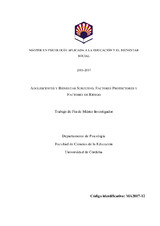Mostrar el registro sencillo del ítem
Adolescentes y bienestar subjetivo. Factores protectores y factores de riesgo
| dc.contributor.author | Sánchez Medina, María de los Ángeles | |
| dc.date.accessioned | 2019-05-06T09:11:20Z | |
| dc.date.available | 2019-05-06T09:11:20Z | |
| dc.date.issued | 2019 | |
| dc.identifier.uri | http://hdl.handle.net/10396/18475 | |
| dc.description | Premio extraordinario de Trabajo Fin de Máster curso 2016-2017. Máster en Psicología Aplicada a la Educación y el Bienestar Social | es_ES |
| dc.description.abstract | El bienestar subjetivo, que influye directamente en la calidad de vida de los individuos, ha sido ampliamente estudiado en los adultos, pero no tanto en los adolescentes. En niveles bajos, puede llevar a los adolescentes a problemas psicológicos, sociales y comportamentales, mientras que en niveles altos se relaciona con una adecuada adaptación al medio y una óptima salud mental. El presente estudio de tipo descriptivo correlacional, tiene como propósito examinar la influencia de diferentes variables psicosociales (extroversión, neuroticismo, responsabilidad, amabilidad, autoestima, autoeficacia social, popularidad y ansiedad social) en el bienestar subjetivo en una muestra de 318 adolescentes de 12 a 17 años de Córdoba, España. Los resultados confirman el modelo predictivo propuesto, que explica un 36% de la varianza, y en el que se observa que todas las variables inciden indirectamente y/o directamente en el bienestar subjetivo. La autoestima, la autoeficacia social, y la popularidad actúan como variables mediadoras en las relaciones que establecen diferentes variables con el bienestar subjetivo, mientras que la ansiedad social actúa simultáneamente como variable mediadora y moderadora. El estudio apunta a la relevancia de promover intervenciones psicosociales y psicoeducativas en las que se tomen en consideración todas estas variables para incrementar el bienestar subjetivo de los y las adolescentes. | es_ES |
| dc.description.abstract | Subjective well-being, which directly affects the individuals’ quality of life, has been widely studied in adults, but not so much in adolescents. At low levels, it can lead adolescents to psychological, social and behavioral problems, while at high levels it is related to an adequate adaptation and an optimum mental health. The first aim of this descriptive correlational study was to examine the influence of different psychosocial variables (extroversion, neuroticism, responsibility, agreeableness, self-esteem, social self-efficacy, likeability and social anxiety) on subjective well-being in a sample of 318 Cordovan (Spanish) adolescents between 12 and 17 years old. The results confirmed the proposed predictive model, which accounts for 36% of the variance, and in which it is observed that all variables affect indirectly and/or directly subjective well-being. Self-esteem, social selfefficacy, and likeability act as mediating variables in the relationships of different variables with subjective well-being, while social anxiety acts simultaneously as a mediating and moderating variable. The study points to the relevance of promoting psychosocial and psycho-educational interventions in which all of these variables are taken into consideration in order to increase the subjective well-being of adolescents. | es_ES |
| dc.format.mimetype | application/pdf | es_ES |
| dc.language.iso | spa | es_ES |
| dc.publisher | Universidad de Córdoba | es_ES |
| dc.rights | https://creativecommons.org/licenses/by-nc-nd/4.0/ | es_ES |
| dc.subject | Bienestar subjetivo | es_ES |
| dc.subject | Factores de personalidad | es_ES |
| dc.subject | Autoestima | es_ES |
| dc.subject | Autoeficacia social | es_ES |
| dc.subject | Ansiedad social | es_ES |
| dc.subject | Popularidad | es_ES |
| dc.subject | Subjective well-being | es_ES |
| dc.subject | Personality factors | es_ES |
| dc.subject | Self-esteem | es_ES |
| dc.subject | Social self-efficacy | es_ES |
| dc.subject | Social anxiety | es_ES |
| dc.subject | Likeability | es_ES |
| dc.title | Adolescentes y bienestar subjetivo. Factores protectores y factores de riesgo | es_ES |
| dc.type | info:eu-repo/semantics/masterThesis | es_ES |
| dc.rights.accessRights | info:eu-repo/semantics/openAccess | es_ES |
| dc.contributor.tutor | Cuadrado, Esther |

